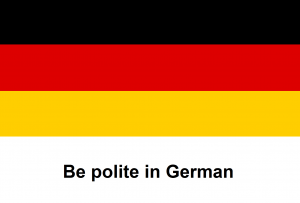Language/German/Grammar/Be-Polite
Hello everyone, 😊
In today's lesson, we will explore the nuances of politeness in the German language, focusing on how to properly address people in both formal and informal settings. Mastering the art of politeness is essential when learning a new language, and German is no exception. After you've gained a solid understanding of this topic, feel free to explore other related lessons, such as Swiss German Grammar - Negation, German Grammar: Noun and Gender, and Swiss German Grammar - Pronouns. These additional resources will help you further improve your German language skills and deepen your understanding of German grammar. So, let's dive into the world of German politeness and make your conversations more respectful and enjoyable! 🇩🇪👍
Understanding the Formal and Informal 'You' in German[edit | edit source]
When learning German, one of the first things you might notice is that there are two different ways to say 'you': the informal 'du' and the formal 'Sie'. Understanding when to use each is crucial for navigating social situations and showing respect.
a. The Informal 'du'[edit | edit source]
The informal 'du' is used when talking to family members, friends, children, or peers. Essentially, it is reserved for people you are close to or have an equal standing with. For example, you would say 'Kannst du mir helfen?' (Can you help me?) when speaking to a classmate or friend.
b. The Formal 'Sie'[edit | edit source]
On the other hand, the formal 'Sie' is used when addressing authority figures, older adults, or individuals you are not familiar with. This includes teachers, police officers, or strangers. When speaking to a teacher, for example, you would say 'Können Sie mir helfen?' (Can you help me?). Note that the English translation remains the same, but the level of formality in German is different.
When in doubt, it is generally safer to use 'Sie' as using 'du' with someone older or in a position of authority could be seen as disrespectful.
Using Formality in Written Communication[edit | edit source]
When writing letters or emails, it is important to maintain the appropriate level of formality. The formal 'you' should be capitalized ('Sie'), while the informal 'you' can be written as either 'du' or 'Du'. The same capitalization rules apply to formal possessive pronouns and forms of address, such as 'Ihre' (your), 'Ihr' (your), 'Ihnen' (you), and 'Ihren' (your).
Conclusion[edit | edit source]
In conclusion, understanding the differences between formal and informal address is essential for demonstrating politeness in German. By using the correct form of 'you' and capitalizing accordingly in written communication, you can navigate social situations with ease and show respect to those you interact with.
Other Lessons[edit | edit source]
- Nouns
- Past Tense
- Questions
- Gender
- Common Mistakes
- Negation
- Pronouns in German
- Imperative Tense
- Adjectives
- How to Use Have


